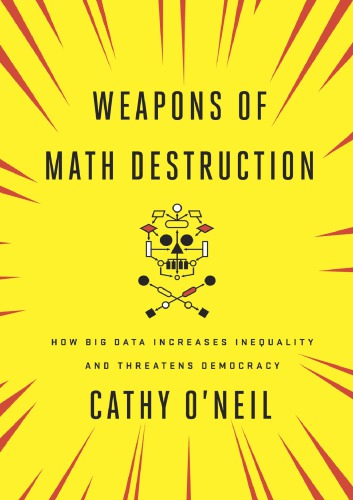
Weapons of Math Destruction
How Big Data Increases Inequality and Threatens Democracy
کتاب های مرتبط
- اطلاعات
- نقد و بررسی
- دیدگاه کاربران
نقد و بررسی

June 13, 2016
This taut and accessible volume, the stuff of technophobes’ nightmares, explores the myriad ways in which large-scale data modeling has made the world a less just and equal place. O’Neil speaks from a place of authority on the subject: a Barnard professor turned Wall Street quant, she renounced the latter profession after the 2008 market collapse and decided to educate laypeople. Unlike some other recent books about data collection, hers is not hysterical; she offers more of a chilly wake-up call as she walks readers through the ways the “big data” industry has facilitated social ills such as skyrocketing college tuitions, policing based on racial profiling, and high unemployment rates in vulnerable communities. She also homes in on the ways these systems are frequently destructive even to the privileged: sloppy data-gathering companies misidentify people and flag them as criminals, and algorithms determine employee value during company-wide firings. The final chapter, in which O’Neil discusses Facebook’s increasing electoral influence, feels eerily prescient. She offers no one easy solution, but has several reasonable suggestions as to how the future can be made more equitable and transparent for all. Agent: Jay Mandel, William Morris Endeavor.

November 15, 2016
As mathematical models affect more and more aspects of our lives, it is crucial to understand that algorithms are not neutral, free from human prejudice and fallibility; instead, those biases and failings are encoded into the systems. Data scientist O'Neil, who blogs at mathbabe.org, explores this premise in depth and chillingly describes the extent to which data-driven, algorithm-based decision making in such areas as hiring, policing, lending, education, and health care actually increases inequality. With barely contained exasperation, O'Neil chronicles the way these "weapons of math destruction"--opaque and unregulated--shape all lives, and, especially, those of the poor. More than just sounding the clarion call to action, O'Neil seeks to empower her readers to ask questions about the algorithms and to demand change. Though the subject matter is alarming and dire, O'Neil's dry wit and ease when describing complicated ideas is more enlivening than depressing. VERDICT This important book will be eye-opening to many readers, possibly even those involved with the kind of models O'Neil criticizes.--Rachel Bridgewater, Portland Community Coll. Lib., OR
Copyright 2016 Library Journal, LLC Used with permission.

























دیدگاه کاربران